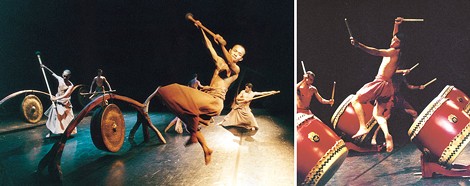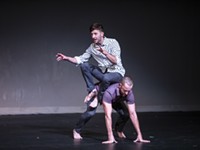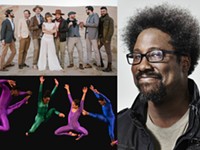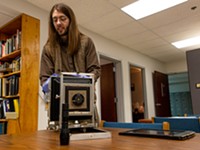[
{
"name": "500x250 Ad",
"insertPoint": "5",
"component": "15667920",
"parentWrapperClass": "",
"requiredCountToDisplay": "1"
}
]
U-Theatre Taiwan's "Sound of the Ocean" at Nazareth College Arts Center last week was a meditative journey that must have spoken personally to each audience member. A primitive, yet finely-tuned energy reverberated from the group's drumming, movement, and theatrical presence that surely reached everyone watching and listening. It was, indeed, like being pulled in by waves, by the tide, like entering the heart of an ocean.
U-Theatre Taiwan originally created this powerful, dramatic work in 1998 to celebrate the group's 10th anniversary with a performance at the renowned Festival D'Avignon in France. "Sound of the Ocean" is meant to simulate the diverse sounds of water through music, drumming, and movement. Although the work is abstract, five sections focus on different aspects of water: "Collapse," "Flowing Waters," "Breakers," "Listening to the Ocean Heart," and "Sounds of the Ocean." Part of the joy in experiencing U-Theatre's magnificent work is the startling power of its unique sound which yet comes hand-in-hand with an innate recognition: a familiarity.
The movement component of the show was less dance than, somehow, a physical extension of the act of making music. In the first two sections, movement manifested itself mainly through the drumsticks. The performance began with the actors (as they are referred to in the program) silently, stealthily filing onto the stage, one by one, to take their places beside a range of differently sized drums. The stage was nearly dark, but the lights in the house remained on initially, creating a sensation of at once being cast into high relief ourselves while anticipating what would occur onstage.
And then, the moment of impact. House lights off, stage lights on, and a violent eruption of loud, insistent drumming as the actors exploded out beats from their instruments in an almost military perfection of unison. The stylized movements of their hands and arms raising and lowering the drumsticks nearly seemed to threaten — like weapons. No one was dozing off in this audience. Interestingly, in a traditionally male-defined art form, half of the actors were women.
Section two, "Floating Waters," was the antipathy of the earlier section, an emotional response to the work's strident beginnings. At first, the music came only from offstage, a gentle twanging of plaintive chords. Like an overheard conversation, small tugs of sound were answered by longer twangs, a kind of waxing and waning as we strained to hear the questing calls and their replies. When the performers strode in, wearing long robes, to take their places beside the drums and begin the dance of their drumsticks, the movements again seemed to visualize the sound for us. This time, the sticks appeared more like antennae — searching, sensing, communicating.
The larger drums issued deeper, richer sounds and, as the beats escalated in pace and volume, continued the back-and-forth with a sort of beat, counter-beat. There was no denying the likeness of the sound to the gush of water, the down-pouring of rain. To close your eyes was to feel the water, to let yourself be cast along by a natural, dramatic force. Powerful.
Part three, "Breakers," brought martial arts moves into play; also, giant gongs. The actors moved seamlessly together in crouched and grounded motions, holding long sticks or mallets which increased their movement range. Soon, they were sounding the drums with the sticks and, then, thrusting them forward to sound the gongs, an affecting combination of physicality and musicality; again, their movements an embodiment of the sound as they jumped and spun, jumped and spun.
U-Theatre was founded in 1988 on Muzha Laochuan Mountain, outside of Taipei, by its artistic director Liu Ruo-Yu after she returned from New York City where she studied under Polish theater director Jerzy Grotowski. Drumming master Huang Chi-Chun studied drumming and martial arts since childhood and went on to study meditation in India. The group draws inspiration from rituals, t'ai chi, drama, music, martial arts literature and dance with the focus on drumming. The members practice t'ai chi, martial arts and drumming on their mountain base and, like Buddhist practitioners, meditate in nature to find their inner selves. The group's goal is to share the tranquility it achieves with audiences.
The hush of the audience at Nazareth implied that this tranquility was, indeed, transmitted from performers to observers. However, it was disappointing to see a good portion of the audience leaving their seats while there was still a sole drummer onstage, slowly bringing the show to an intimate close.
Speaking of...
Latest in Culture
More by Casey Carlsen
-
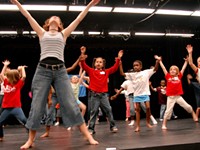
A new generation
Jun 7, 2017 -
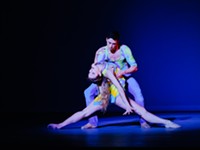
Dance review: RCB's 'Summer of Love'
Apr 21, 2017 -
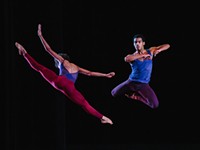
Dance review: Garth Fagan home season
Dec 1, 2016 - More »
